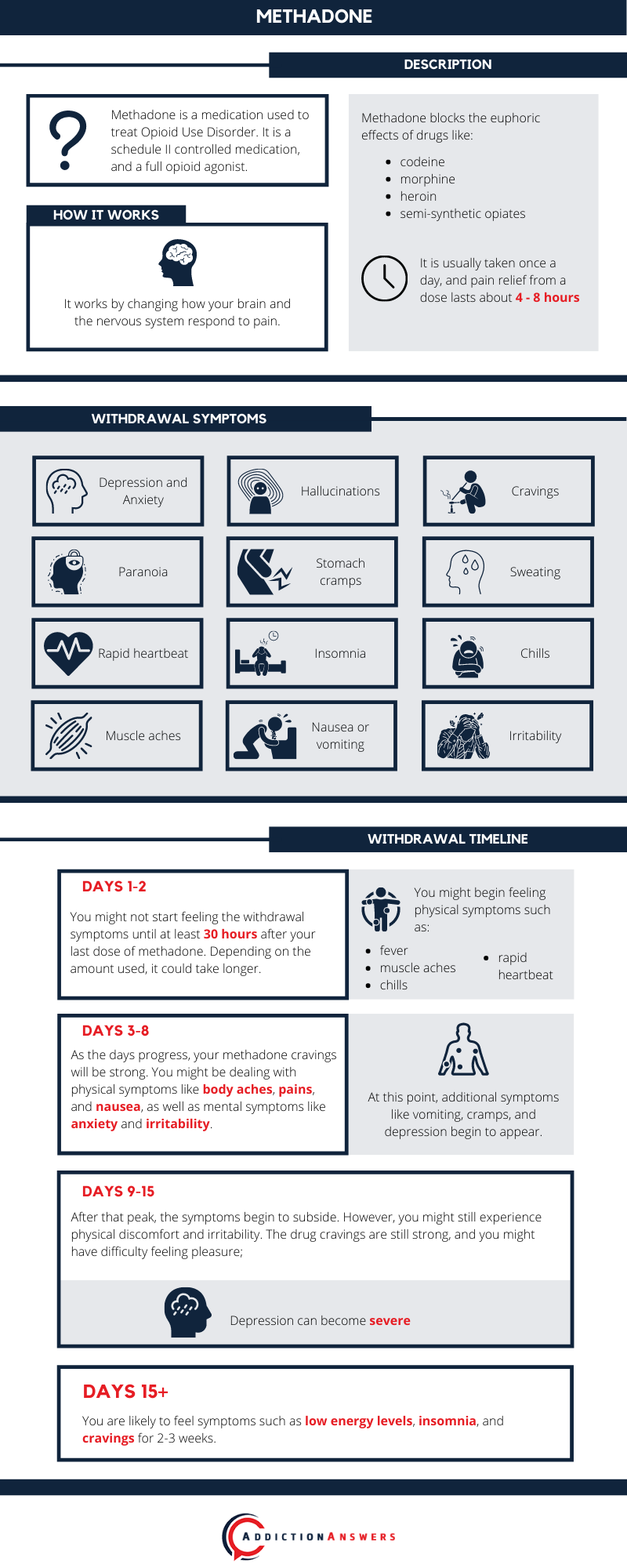Table of Contents
Methadone is a prescription drug that is used to treat pain. It is commonly used in medication-assisted treatment of opioid addictions. If it is administered correctly, it can help people quit heroin and other opioids without withdrawal.
However, methadone is itself an opioid and can be addictive. You can become addicted to methadone as you are getting weaned off other prescription painkillers.
Once you stop taking methadone after using it for a while, it can lead to withdrawal. Methadone withdrawal is an unpleasant experience, and so it’s important to be aware of the risks and benefits associated with any methadone treatments.
How long does methadone withdrawal last? Keep reading to learn more.

Table of Contents
What is Methadone?
If you’re looking at medication-assisted treatment to quit using heroin or other opiates, you should know that methadone is usually one of the medications used. It’s been around for decades as a way to treat people who are addicted to narcotic pain medicines. If taken as prescribed, it is safe and effective.
Methadone allows people to heal from their addiction in a safe and healthy way. It works by changing how your brain and the nervous system respond to pain. Methadone decreases painful symptoms of opiate withdrawals and blocks the euphoric effects of drugs like codeine, morphine, heroin, and semi-synthetic opiates.
Methadone is administered in liquid, pill, and wafer forms. It is usually taken once a day, and pain relief from a dose lasts about four to eight hours.
With any medication used in medication-assisted treatment, it is best to take methadone as part of a treatment plan.
Withdrawal Symptoms
Withdrawal is the combination of both mental and physical effects that a person experiences once they stop using or reduce their substance intake. This includes things like prescription or recreational drugs and alcohol.
When you use a substance with a high potential of dependency, your body gradually adapts to the presence of drugs in your system. When you abruptly stop after long-term use, it can make your body violently sick and produce a range of bothersome withdrawal symptoms. This is your body trying to adapt to the sudden absence of those drugs.
Not only is withdrawal unpleasant, but it is also potentially dangerous in many cases. Let’s take a look at methadone withdrawal symptoms:
- Depression
- Hallucinations
- Cravings
- Paranoia
- Stomach cramps
- Sweating
- Rapid heartbeat
- Insomnia
- Sweating
- Anxiety
- Chills
- Muscle aches
- Nausea or vomiting
- Irritability
Methadone withdrawal can be particularly irksome because of how long the medication stays in the body. The symptoms tend to be moderate and flu-like. If you have a more severe methadone addiction, your withdrawal symptoms will likely be worse.
You don’t want to quit cold turkey; this can cause more severe withdrawal symptoms. That’s why doctors recommend gradually reducing the use of methadone, so the withdrawal process is more bearable.
How Long Does Methadone Withdrawal Last?
Withdrawal symptoms are typically present within 24 hours of the user’s last dosage. It can take from 15 to 60 hours for methadone to be out of your system.
Let’s take a look at the methadone withdrawal timeline so you can get a better idea of how long symptoms will last.
Days 1-2
You might not start feeling the withdrawal symptoms until at least 30 hours after your last dose of methadone. Depending on the amount used, it could take longer. You might begin feeling physical symptoms such as fever, muscle aches, chills, and rapid heartbeat.
Days 3-8
As the days progress, your methadone cravings will be strong. You might be dealing with physical symptoms like body aches, pains, and nausea, as well as mental symptoms like anxiety and irritability.
Because methadone stays in your body for so long, it might take between 3 to 8 days for the symptoms to peak. At this point, additional symptoms like vomiting, cramps, and depression begin to appear.
Days 9-15
After that peak, the symptoms begin to subside. However, you might still experience physical discomfort and irritability. The drug cravings are still strong, and you might have difficulty feeling pleasure; depression can become severe.
Days 15+
You are likely to feel symptoms such as low energy levels, insomnia, and cravings for 2-3 weeks. Be aware that even after your detox process is over, you might still experience post-acute withdrawal symptoms. This can continue for many months or even years.
Treatment and Relief
If you’re on the path to recovery, you may be wondering how to cope with methadone withdrawals. The good news is that there are several treatment options for you to consider.
Drug treatment centers utilize therapists and physicians’ expertise to create a personalized treatment plan for their patients. Inpatient treatment programs are a great way for moderate to severe methadone addicts to recover in a safe environment.
Inpatient programs require you to stay in the facility. There is constant medical treatment, various therapy programs as well as life skills training. No two programs are the same, so you have thousands of options for treatment.
There are also outpatient programs to consider. This works best for patients whose additions were diagnosed as minor by a substance abuse professional or completed an inpatient program but are new to sobriety.
Each outpatient program has different levels of care, so it’s important to talk to a professional to determine the care you need.
Get the Help You Need
Two out of three drug overdose deaths in 2018 involved an opioid. Methadone is meant to be used as a way to reduce other drug withdrawal symptoms.
Unfortunately, methadone can be addictive itself, and people become dependent on it. Methadone withdrawal is unpleasant and requires professional medical assistance. Luckily, you have many options when it comes to finding treatment that works for you.
Before you know it, you’ll be on the right path to overcome addiction once and for all.
Are you or a loved one struggling with addiction? Be sure to check out the treatment section of our blog to get the help you need.
Get Help Today
Don’t go through the process of recovery alone. There are people who can help you with the struggle you’re facing. Get in touch with one today.



